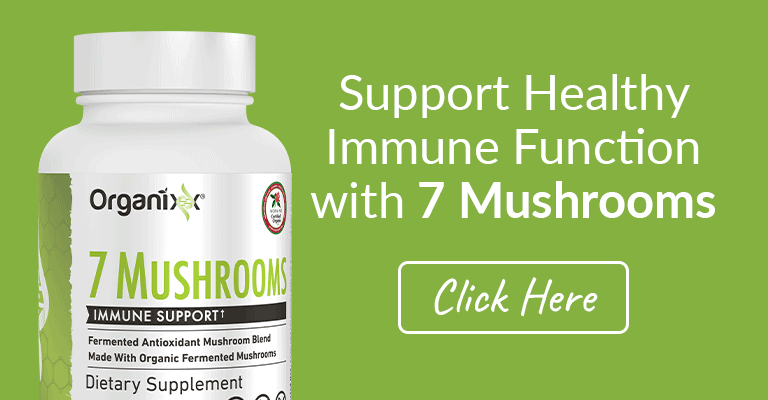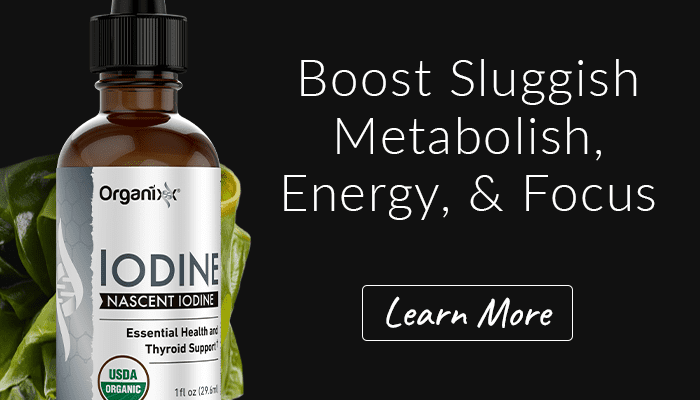Video Transcript:
Today, I am so excited to share with you the healing power of mushrooms. This is one of life’s greatest little secrets of healing that you can tap into to harness the impact of the healing benefits of medicinal mushrooms.
I can’t wait to share with you the benefits here because many times, most of us are going to be consuming mushrooms, maybe on your pizzas or in your salads, but there is a greater quantity of mushrooms in what we call the mushroom kingdom. This is a potent class of compounds that have massive mineral density. Some of the most nutrient-dense foods are mushrooms, and this is across all different continents. We see a multitude of mushrooms that always register as the top 10 food sources with their nutrient density.
Anatomy of a Mushroom
One of the things I want to share with you, there’s definitely different parts of the mushroom that are going to be more potent and powerful for their medicinal properties. Often, you will see the fruiting body, that’s the head of the mushroom. That is what might be on the ground or growing out of a tree or on a log. That is what we call the fruiting body. And sometimes some of these mushrooms are going to have a fruiting body once a year. Other fruiting bodies take 20 to 30 years to fully develop. So you’re going to harness some of the mushrooms – for instance, like chaga – you’re going to harness the years of development and growth of the density and the nutrient properties inside this mushroom.
Mushrooms also have the root system. So if you consider a mushroom in whole as an apple tree, the actual trunk of the tree and the root system are the mycelium. That tends to be underground or not exactly visible by the human eye. This is really, really critical because a lot of times the root system will be not visible, but also feeding on the dirt and the earth.
What Makes Mushrooms So Medicinally Potent
And one of the things that we find that makes mushrooms so medicinally potent is that we, as humans, are actually closer in nature to mushrooms than we are to plants. I know that probably sounds really crazy – the DNA and everything’s totally different – but the plants are very different from mushrooms and mushrooms are in their own category. In the mushroom kingdom, we will find 1.5 million types of fungi. That’s what mushrooms are, they’re a type of fungus. These fungi need food sources, like us. And often the food sources that they feed on is going to be dirt, different types of soil, as well as trees. Sometimes living trees, sometimes dead tree stumps or logs, but it’s part of the ecosystem. And it’s really critical that with mushrooms, their survival is built on their capacity to expel carbon dioxide. So very similar to humans, we have a kind of pairing, if you will, to our capacity to intake these medicinal properties of mushrooms.
One of the things that I like to tell a lot of my patients is, folks that are like, “Oh, I’m not sure if I want to consume a mushroom tea or take a mushroom liquid tincture or an herbal capsule,” like the 7 Mushrooms, one of the things that I tell everybody is that mushrooms really are nature’s true, natural, original medicine cabinet. And there’s no coincidence that over 50% of the pharmaceuticals that are used on the market, their origin comes from mushrooms. So mushrooms are actually in the origin of the formulations of pharmaceuticals that we use and, in fact, top 10 pharmaceuticals used routinely. High blood pressure pills, cholesterol-lowering medications, blood sugar-balancing medications, those are all rooted in mushrooms. So I’m hoping you see a trend here, you can tap into the natural medicinal properties.
Key Benefits of Consuming Functional Mushrooms
So I want to list for you some of the key benefits that you’ll find by consuming mushrooms, functional medicinal mushrooms, on a daily basis. The benefits will include increasing your vitality, your vigor, your energy, your zest for life. Your mood and mental outlook increases. We will see overall that using certain medicinal mushrooms like chaga, reishi, maitake, lion’s mane, turkey tail, those are all also ingredients here in 7 Mushrooms, you will find a great bolstering to your immune health, and this is really critical.
There’s been a ton of research where we’ve seen the mushrooms, when studied, they help to improve cell turnover. So they help to enhance the capacity for your organs and your tissue to be more youthful, to have more capacity to handle stress internally, as well as externally. And ultimately, mushrooms fall into an adaptogenic category, meaning they are non-addictive, they’re natural in their orientation, and every day they’re utilized by your body differently to focus solely on normalizing your body’s systems to create homeostasis.
Homeostasis is a fancy term for body balance. So if you are watching this video and you’re thinking, “Oh my gosh, I feel tired. I feel fatigued. I have imbalanced blood sugar. Maybe I have high cholesterol. I have high blood pressure,” or maybe you feel stressed out, burnt out, brain foggy – mushrooms, medicinal mushrooms, can highly, highly benefit and turn around those often experiences that people have from stress or from imbalances within their body. So these mushrooms help to create balance and homeostasis.
They also energize our body, so they boost up our energy. They get our body better operating. We have vascular benefits that we see, a reduction in the blood pressure so that we have greater oxygenation, in many cases to the heart. That’s improved by some of the mushrooms.
We also see, because of the way mushrooms grow and how they get their source of food and energy, we find that the mushrooms directly positively impact our microbiota – our digestive gut microbiome. That’s a fancy term for the gut health. Your gut and the bacteria in your gut actually is greatly enhanced and balanced by consuming mushrooms. There’s been a lot of research here where we know that individuals who consume foods that are eating dirt and trees, tree bark, they have a greater optimization of their digestive flora, the gut bacteria levels balance and as a result, that improves our immune state.
Research on Brain Health and Mushrooms
Now, I also want to share with you some really amazing research, as well as details about the benefits mushrooms can have on our brain health. This is really critical for all ages, young children, who, like I have a six-year-old who’s in kindergarten, he’s using his brain a lot, we have him consuming functional mushrooms every day. And we have elder parents and they’re consuming functional mushrooms. So the whole broad spectrum of individuals who want positive, enhanced cognitive health really benefit by consuming mushrooms. Particularly lion’s mane is one of my favorite mushrooms that has an amazing amount of research showing that the mushroom itself, the properties of lion’s mane, can actually rejuvenate nerve tissue. Nerve cells rejuvenate, it restores functionality and vascularity to our brain and can limit brain fog and actually turn around depression.
It’s pretty phenomenal when you think about where we’re shooting this video right now, we’ve just gone through the time change, so if you find you have seasonal depression, if you live in the northern hemisphere or the southern hemisphere, these mushrooms can also help balance your central nervous system. So that’s really critical for individuals who have gone through a lot of stress and individuals that need adaptogenic support.
Let’s Talk Adaptogens
So I want to talk to you a little bit about adaptogens because this is really what I feel, as a naturopath, the true harnessing potency of mushrooms, where this lies. Simply put, adaptogens, in the mushroom kingdom, allow the body to use the multiple multitude of benefits, the multitude of properties – there are polysaccharides, there’s all sorts of cell-enhancing properties, there are massive amounts of minerals. Sometimes we will see, in some cases, certain mushrooms will have an increase in selenium, like shiitake, or we will see turkey tail will enhance liver production of bile. We will see certain polysaccharide peptides, again, in a turkey tail, that are highly, highly beneficial for supporting healthy cell turnover. And that may vary. Your need one day may vary from another day. If you are a fitness enthusiast, if you are exercising and training for a competition, or you’re planning to do a half-marathon or an Iron Man, this is where all of these mushrooms, particularly a blend like this, would be beneficial in consuming because you are going to get a multitude of benefits. You’re going to have your body recover faster.
Cordyceps: An Energy Booster
One of the most amazing athletic beneficial mushrooms is cordyceps. This is an energy booster. I use this for folks that have chronic fatigue, that are dealing with post-COVID long haulers. It enhances your stamina, it increases and boosts your physical recovery so you have better performance and you maintain the performance level longer. This particular mushroom, cordyceps, has been greatly, greatly studied, and it’s a really crazy mushroom. It doesn’t grow in the dirt and it doesn’t even grow on an actual tree. You won’t find it on a log unless it has fully grown in its full capacity.
So let me tell you a little bit about cordyceps. Cordyceps is actually known as a caterpillar fungus, and it starts its life on the back of a particular type of caterpillar. And over time, as it grows, it ends up consuming its own host. It is the craziest mushroom ever. But in part of that whole host consumption, it harnesses this energy, and the cellular energy helps slow down the aging process. We also will see it can help control autoimmune diseases. So for many of my patients that are dealing with rheumatoid arthritis, maybe Sjogren’s disease, they might be dealing with thyroiditis or Hashimoto’s, they might also be dealing with a multitude, cascade, MS, even they’ll have multiple diagnoses where there are multiple autoimmune disorders, sometimes we’ll see Crohn’s and colitis cases correspond to a rheumatoid arthritis or even a lupus case. This particular mushroom, cordyceps, would be greatly beneficial in helping to calm the immune health.
So there’s a bolstering of immune health in some cases that we will find where the mushrooms bring benefit. Then we will also see a calming of the immune state. For instance, in cordyceps with autoimmunity.
Turkey Tail: Stave Off Tumor Cell Growth
So turkey tail, I’ve mentioned a little bit about that particular mushroom, that actually has the ability to stave off and starve off tumor cell growth. So this is really critical for folks that might have precancerous cells or early stages of cancer diagnosis. We will also use this in a cancer protocol and post-recovery. Really, really beneficial. And the polysaccharides, these peptides are really, really critical for enhancing the benefits and harnessing the power of that particular mushroom.
A Personal Use Case You May Relate To
Now, I want to share with you another big benefit. We talked a little bit about stress and adaptogens, but we often will find that when the body is in a state of stress, and this could be not just the, “Oh, I’m stressed out,” but literally we have physiological internal stressors – you have a tear, you’ve had an injury, you might be dealing with just chronic joint inflammation, you have had a stressful work environment, you might have a situation like what we’re dealing with right now in my household. We just moved to Texas. Three weeks into moving into our house, we discovered we have a mold situation. Now that, friends, is what we call an external stressor, and it is quite overwhelming. We’ve had two mold tests now. I’m happy to report we have eradicated the really unhealthy black mold. And mold is a fungus, so there are healing fungi and there are unhealthy, toxic fungi. So there’s a balance in the mushroom kingdom as well.
But I want to share with you the whole aspect of the adaptogens are really critical here. So in my family, with our mold outbreak in our house, and we also discovered a lovely situation where the air vent was right alongside, and it was completely exposed to the mold spores. They were active, we had an active leak. And guess what? It got sucked up into our air and now we’re dealing with a bigger air quality issue. In that case, we and my family are using an assortment of functional medicinal mushrooms, and that’s where 7 Mushrooms comes in really, really handy for us and our family.
My six-year-old, while he doesn’t swallow the capsules, I break them open and I sprinkle about a half a capsule for him in the morning in his nut yogurt. So he’s able to consume the powder form of this assortment. There’s turkey tail, there’s chaga, there’s cordyceps, there’s shiitake, there’s reishi, maitake, and lion’s mane. All really, really beneficial.
Reishi: Calm The Central Nervous System
And what we’ve seen is, all of us, Brian, my husband, Gabriel, my son, and myself, we’re all dealing with an assortment of environmental stressors taxing our system. The nature of having mold remediation in our house while we’re trying to live here and work here has been challenging and highly stressful. So we are getting the benefits of reishi, for instance, will calm our body down. Reishi’s awesome to take at night. So if you are like us, we’re kind of having sleep imbalances because of the kick-up of the spores, we find that the central nervous system is soothed by a mushroom like reishi.
Lion’s Mane: Fights The Fatigue
And then for me, my main symptom is really massive fatigue. I feel like this mold is kicking up my chronic fatigue syndrome that I’ve had throughout my 20 years of dealing with my own health crisis, that’s what got me into this field, but lion’s mane is what I really am feeling highly beneficial in terms of me being able to keep my mind in the daily work mode and also helps me to support the fatigue I’m experiencing.
Shiitake: Bolster Immunity
Same with shiitake, I’m enhancing my white blood cell count there to enhance my cell response, the mechanisms of my immune system, to respond to the invader of any mold spores that I’m inhaling.
How to Use Mushrooms in Your Daily Diet for Health Support
So there are a lot of different ways that you can use mushrooms and incorporate these into your daily diet. I do recommend that you alternate how you’re consuming them, meaning if you need more central nervous system support because you have insomnia, maybe you need to take it at night. But then also if you’re feeling fatigued, like I feel fatigued and run down and I’m sleeping nine hours a night and I’m still tired, I take it in the morning as well. So there’s a lot of different ways for you to incorporate these into your diet. I also drink teas and I will also mix in the powders into some of my smoothies and things like that. So you can think outside the box in terms of using these mushrooms. But ultimately, if you are seeking to really, really tap into nature’s medicinal cabinet, if you will, all of the different things that we want to harness – vitality, energy, youthfulness, minimizing free radical damage, and that comes from us living in our world, it’s consuming our water sources and just really the aging process, that can be really, really beneficial.
And then for really serious chronic conditions, we can see turnover of cells. For instance, we can get a really good turnover of our liver cells specifically when we are going to consume reishi. Reishi has an amazing capacity to help the liver rejuvenate itself, so sclerosis of the liver, a non-alcoholic fatty liver, which is really common if you have high cortisol and high insulin levels.
But overall, these mushrooms will help address all of your body’s systems. We will see a reduction in the stress-response mechanism, so we will see a better capacity for your body to cope with and adapt to stress. We see a vascular benefit or cardiovascular health benefit. It has a direct benefit. We also see our pancreas be benefited by these mushroom properties, as well as their mineral density. The mineral density of these mushrooms allow our body to take in the key minerals to help minimize insulin resistance and glucose intolerance. The list goes on. I could go on seriously for hours about how many benefits and how many health conditions or concerns you might be dealing with that can have a benefit from consuming mushrooms.
But in the totality of my healing power of mushrooms talk with you today is I just want you to know you can harness the powerhouse of adaptogenic, antioxidant, anti-cancer, anti-inflammatory, balancing multi-system homeostasis that mushrooms can bring to your life. They are fantastic. They’re so amazing. And I hope you’ll check out a link down below where I detail some of the different recommendations for 7 Mushrooms and also some additional supplements that can also max out the potency of those nutrients that are going to find in this supplement.
So I’m excited for you to try mushrooms today. Keep us posted. Let me know what symptoms you find positively benefited by consuming the 7 Mushrooms.
7 Mushrooms from Organixx contains 7 of nature’s most powerful mushrooms for anti-aging, longevity, and immune support. Using centuries-old knowledge of the power of nutritional mushrooms and our breakthrough new formulation process we’ve unleashed the power of mushrooms in a way never before done.
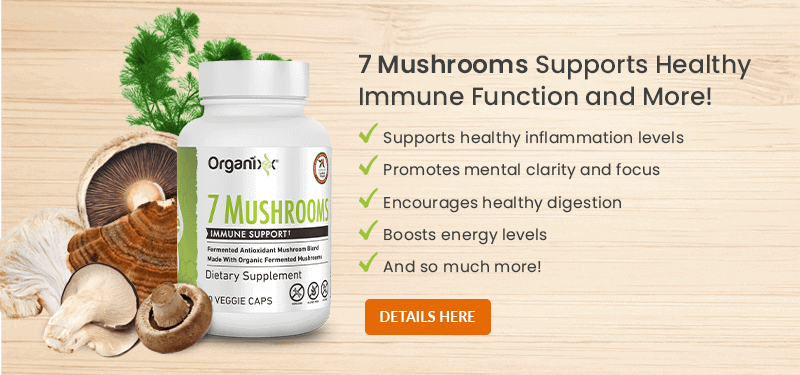
Did you know that shiitake mushroom is the second-most consumed type of mushroom across the globe after the common button mushroom? But are shiitake mushrooms good for you? And do they have any benefits beyond just being delicious in a salad or stir-fry? The answer is a resounding YES! And the good news is that it only takes a small quantity to make a remarkable difference to your health. Read on for shiitake mushroom nutrition facts and the amazing health benefits shiitake has to offer.
- What Are Shiitake Mushrooms
- Shiitake Are More Animal Than Plant!
- Shiitake Mushroom Nutrition Facts
- 4 Key Shiitake Health Benefits
- Important Shiitake Vitamins
- 8 Other Superstars of Shiitake Nutrition
- Shiitake Health Benefits for the Immune System & Cancer
- Adding Shiitake Mushroom to Your Health Regimen
What Are Shiitake Mushrooms?
Known as “shiitake” in Japan and “xianggu” in China, the scientific name for shiitake mushroom is Lentinula edodes. These fungi have been used for centuries in Asia as a medicinal food. There is evidence of shiitake mushrooms being cultivated as early as 1100 AD in China, where they were used to:

- ward off the common cold
- boost energy
- enhance wellness
The part of shiitake mushrooms that is consumed is called the fruiting body. It has a texture that can range from tender when raw, to a surprisingly meaty texture when cooked. Its umami flavor (especially when using dried mushrooms) makes it a culinary favorite. (Learn more about cooking with shiitake and other mushrooms here).
The main body of shiitake consists of thin white strands known as mycellia, and it is these strands that colonize tree stumps, dead and fallen trees, and other decaying organic matter. That’s where shiitake grow best, just like other prized medicinal mushrooms such as turkey tail mushrooms, maitake, and reishi mushrooms.
Shiitake Are More Animal Than Plant!
Most everyone thinks of mushrooms as a plant, but genetically shiitake mushrooms are actually considered to be closer to the animal kingdom than to the plant kingdom! Here’s why…
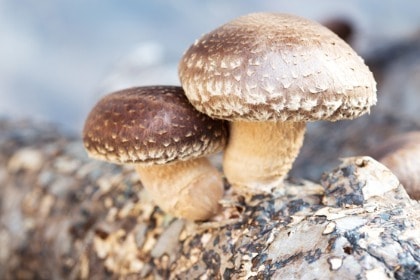
Like animals, shiitake have the ability to synthesize glycogen, a storable form of carbohydrate. This is part of what makes shiitake mushrooms so special – their many unique carbohydrate nutrients.
Because shiitake mushrooms like to grow on fallen trees, they also use enzymes that help to break down components of wood. These enzymes have also been found to provide health benefits to us humans.
Shiitake Mushroom Nutrition Facts
Shiitake nutrition is fairly well-studied, although science does seem to keep finding new shiitake mushroom benefits all the time. The USDA food database [1] shows that 100 grams of raw shiitake mushroom contain:
- 34 calories
- 2.24 grams of protein
- 0.49 grams of fat
- 2.5 grams of fiber
- 6.7 grams of carbohydrates
But just knowing the nutritional value of shiitake mushrooms doesn’t reveal the full extent of all the health benefits shiitake actually offers.
4 Key Shiitake Health Benefits
Shiitake have a wide range of health-promoting functions in the human body, including four very substantial benefits:
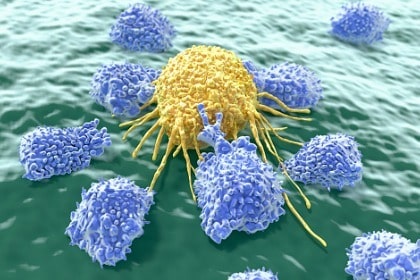
- Boosting immunity
- Acting against viruses
- Beating inflammation
- Helping to inhibit cancerous tumors
Shiitake are even “anti-fungal” which seems counterintuitive considering that they’re part of the kingdom of fungi [2]!
Let’s dive into some of the best, most therapeutic vitamins, minerals, and phytochemicals (natural, plant-based chemicals) found within shiitake that are responsible for these impressive health benefits.
Important Shiitake Mushroom Vitamins: D and B
Vitamin D
If shiitake mushrooms grow in the sun, they will be a good source of vitamin D and contain high concentrations of vitamin D precursors. Shiitake mushrooms also produce vitamin D3 and vitamin D4, which makes them a good vegan source of this vitamin [3].
Vitamin D has a huge range of biological actions in the body, including being required for:
- strong, healthy bones and teeth
- regulation of insulin levels
- immune system function

Your cardiovascular system, brain, and nervous system all need vitamin D. Vitamin D also influences the expression of genes involved in cancer development, so it’s considered an anti-cancer vitamin as well.
B Vitamins
Shiitake mushrooms are a very good source of B vitamins, which are required for many crucial functions in the body, including:
- supporting adrenal function
- the conversion of nutrients from food into energy
- DNA repair
- red blood cell production
- good brain health and nervous system function
- hormone balance and cell growth
Despite their importance for good health, many of us are deficient in one or more B vitamins.
8 Other Superstars of Shiitake Nutrition
#1. Eritadenine

Eritadenine is a unique alkaloid from shiitake which has been shown to inhibit the activity of an enzyme called angiotensin-converting enzyme (ACE) [4]. When ACE is active, it results in blood vessel constriction, which means that blood has less space in which to flow through the vessels. Inhibiting ACE helps to keep blood vessels a healthier, wider diameter, thus allowing a more normal range of blood pressure.
For years, doctors have prescribed synthetic drugs as ACE inhibitors. They are, however, notoriously toxic to the body, especially the kidneys [5]. They can also cause side effects and problems for the lungs, so natural ACE inhibitors like eritadenine in shiitake are especially valuable.
#2. Beta-Glucans
Beta-glucans are a special group of carbohydrate-related molecules known as polysaccharides (a long chain of linked sugars). Beta-glucans come with their own long list of important health benefits:
- Beta-glucans act as prebiotics which support the growth of beneficial gut bacteria. This, in turn, benefits the immune system as 70-80% of the human immune system is located in the gut [6].
- As beta glucans travel through the digestive tract, they inactivate the key enzyme of cholesterol metabolism, thus lowering cholesterol absorption [7,8]. They have also been found to reduce the incidence of atherosclerotic plaques in blood vessels [9].
- Beta-glucans act as antioxidants with strong free radical scavenging activity [10].
- Lentinan, a beta-glucan isolated from shiitake mushrooms, has been utilized for decades in Chinese and Japanese clinics for its anti-tumor properties and immune modulating benefits [11-14]. Lentinan was also found to be potentially useful in a 2019 study for managing inflammatory skin diseases or disorders caused by environmental pollutants [15].
Shiitake Mushroom for Weight Loss

Shiitake can even help with everyone’s favorite topic – weight loss. The simple sugars from shiitake are a soluble fiber. They slow down food transit time through the intestines and don’t cause a rise in blood sugar levels. Beta-glucans are known to help us lose weight. Being a soluble dietary fiber, beta-glucans help us to feel fuller for a longer period of time.
By eating shiitake mushrooms, you sort of trick your brain into believing you have eaten more than you actually have. Because you feel fuller, this can help with weight loss. In an animal study, it was shown that rats fed shiitake mushrooms along with a high fat diet over a period of six weeks did not gain weight. The rats who ate higher amounts of shiitake mushrooms were 35% slimmer than the other groups [16].
#3. LEFE
Isolated from shiitake mushrooms, LEFE (also known as “lentinus edodes fibrinolytic enzyme”) has been found to help control platelet aggregation in the bloodstream. When blood platelet cells clump together this can form a blood clot (thrombosis), which can create a myriad of serious health problems.
Researchers believe that LEFE may have applications for thrombosis-related cardiovascular disorders [17].
#4. Copper
Shiitake mushrooms are our fourth best food source of copper (coming after sesame seeds, cashews, and soybeans). An enzyme found in shiitake mushrooms known as laccase contains copper [18].
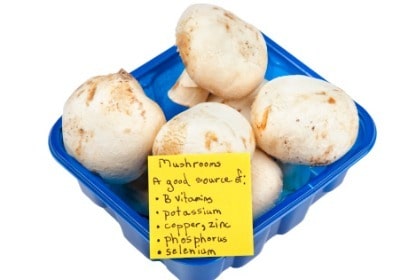
Just one-half cup of cooked shiitake mushrooms can provide you with 650 micrograms (mcg) of copper, which is about 72% of the recommended daily amount (RDA) of copper.
Copper is required by the body for forming red blood cells, together with iron. Copper is also required for good bone health, healthy blood vessels and nerves, and the immune system needs it in order to function properly [19].
#5. Zinc
Shiitake mushrooms contain zinc, an important antioxidant mineral. After iron, zinc is the most abundant trace mineral in the body and is required for many vital activities.
Over 300 enzymes require zinc for proper functioning in cellular metabolism, nerve cell activity, digestion, and many other processes. Zinc is also required by the body for:
- the immune system
- skin health
- DNA synthesis
- production of proteins
One single shiitake mushroom contains around one percent of the RDA for zinc.
#6. Selenium
Another important antioxidant mineral, shiitake mushrooms are a great vegan source of selenium. Required by the immune system and thyroid for proper function, selenium also helps to battle inflammation, is needed for skin health, and is required for glutathione peroxidase, a powerful antioxidant enzyme.

Many studies have found that selenium also has anti-cancer properties. In fact, selenium-containing compounds are being researched as alternatives in experimental chemotherapy in cases of multi-drug resistant breast cancer [20].
One cup of shiitake mushrooms provides about 51% of the RDA for selenium.
#7. Sulfur Compounds
Sulfur compounds from shiitake mushrooms have some important functions in the body and give shiitake mushrooms (especially the dried variety) their characteristic smell.
Lenthionine is one such sulfur compound, found to be [21,22]:
- antimicrobial
- cytotoxic (toxic to cancer cells)
- anti-inflammatory
- antioxidant
A 2004 study found that lenthionine also inhibited platelet aggregation (discussed above under Eritadenine) [23].
Another sulfur compound in shiitake is ergothioneine. It has been shown to have immune-boosting functions [24], as well as antioxidative and cell-protective properties [25].
#8. Lentiavidins
Lentiavidins are unique proteins from shiitake mushrooms, similar to egg white proteins. They bind with biotin, a B-complex vitamin. While research is ongoing and it’s not clear precisely what the health benefit is, lentiavidins are thought to be beneficial for helping the body to utilize biotin [26].
A Closer Look at Shiitake Health Benefits for the Immune System & Cancer
There are two potential health benefits of shiitake that deserve closer examination:
- the beneficial effect that they have on the human immune system, and
- their ability to help people with cancer.
Shiitake and the Immune System
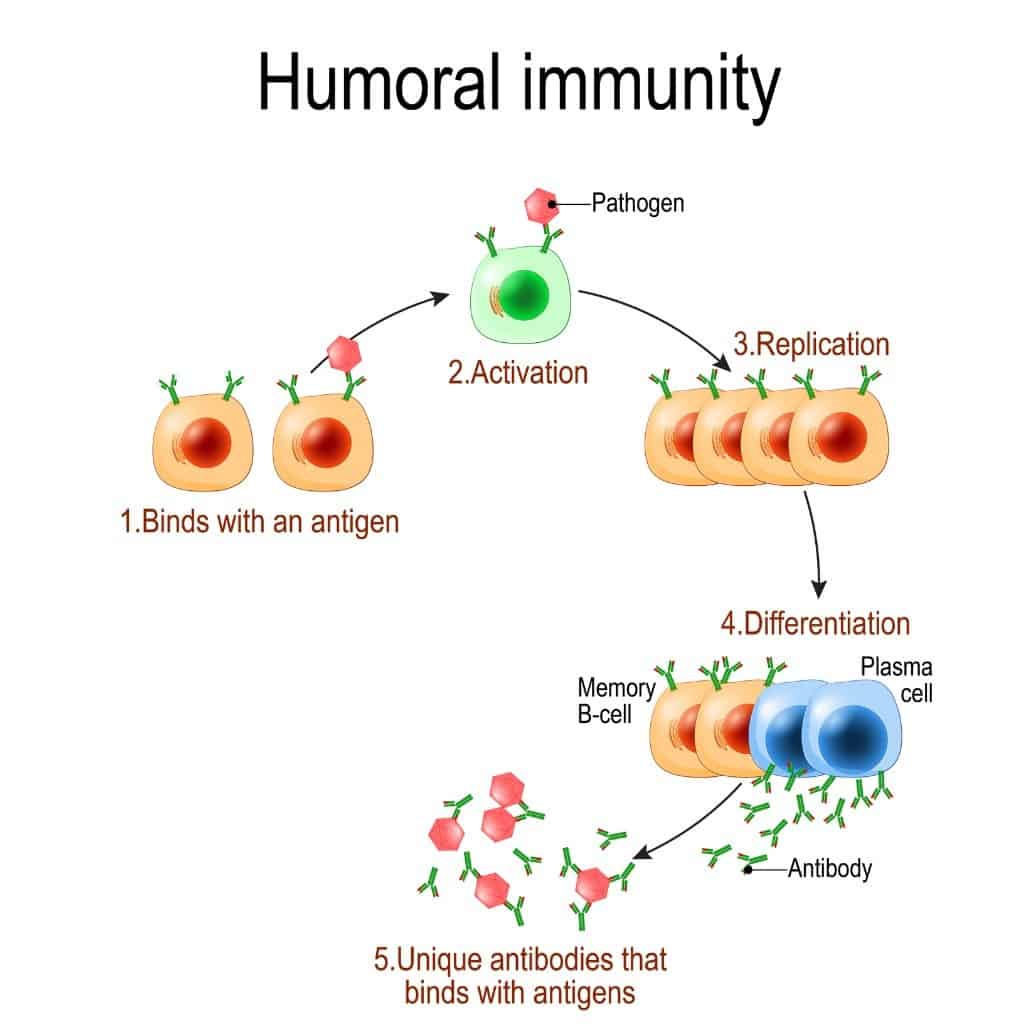
Without getting into a lot of technical jargon, there are two main sections of the human immune system. One is humoral immunity in which the immune system triggers specific B-cells to grow, go forth, and secrete large amounts of specific antibodies.
These antibodies are then used to combat a particular microorganism or a virus in order to stop an infection.
The other type of immunity is called cell-mediated immunity. This involves the activation of immune cells known as phagocytes and antigen-specific cytotoxic T-cells, and the release of various cytokines (chemical messengers) in response to the presence of toxins or other foreign substances.
A 2014 animal study found that shiitake (along with maitake mushroom) extracts “strongly stimulated” both branches of the immune system – cellular and humoral [27].
A 2013 animal study [28] investigated the role of shiitake mushroom extract on a cytokine known as interleukin-23 (IL-23).
IL-23 is produced by dendritic cells of the immune system. Dendritic cells act as messengers between the two arms of the immune system. They are responsible for collaring potentially harmful or allergenic substances and presenting them to T-cells which will render the substances harmless. The 2013 study showed that intake of shiitake mushroom extracts increased IL-23 levels, and enhanced gut immunity.
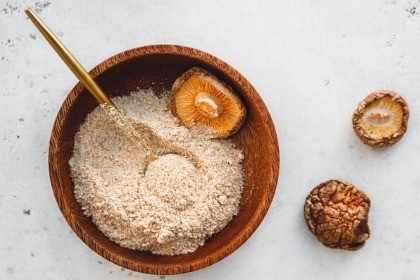
A small 2015 human clinical trial [29] investigating shiitake mushrooms found that a relatively small quantity of dried shiitake mushrooms made a big impact. In the study 52 healthy men and women took either five or ten grams of dried shiitake mushrooms daily for four weeks.
Researchers found that only five grams of dried shiitake (0.17 ounces) increased immunity and lowered inflammatory markers in the study participants.
Shiitake and Cancer
Due to their potent anti-inflammatory, anti-microbial, and immune-boosting properties (not to mention those beta-glucans), it shouldn’t come as a surprise that shiitake mushrooms have been found by researchers to display anti-cancer activity.
Dozens of studies have shown that shiitake may be beneficial for cancer patients in a variety of ways:
- In cell studies, shiitake inhibited the growth of breast cancer, myeloma, larynx carcinoma, lung cancer, gastric cancer, lymphoma, and osteosarcoma cells [30-32].
- They are cytotoxic (toxic to cancer cells) to non-small cell lung cancer, triple-negative breast cancer, cervical cancer, and prostate cancer in cell studies [33,34].

- They have chemopreventive (cancer-preventive) properties [35].
- Shiitake mushrooms contain a protein known as latcripin, which has been the subject of many studies which evidence its action against cancer cells, especially gastric cancer [36-39].
- A 2016 animal study [40] found that shiitake’s beta-glucans exerted “a profound inhibition ratio of ~75%” against murine (mouse-derived) sarcoma tumors, working even better than a commonly utilized chemotherapy drug, Cytoxan (also known as cyclophosphamide), which only inhibited the cells by around 54%.
This study also demonstrated that the beta-glucans from shiitake strongly promoted the accumulation of immune cells into tumors which resulted in apoptosis (programmed cell death) and inhibition of proliferation (rapid growth) and angiogenesis (the process by which tumors develop new blood vessels in order to feed themselves).
The beta-glucans also promoted tumor suppressor genes and down-regulated (inhibited) genes that promoted the growth of the tumors.
- A small 2016 clinical trial [41] investigated the use of shiitake mushrooms for 10 cancer patients receiving immunotherapy at a Japanese clinic. The patients’ quality of life symptom scores worsened during the first four weeks of treatment when they were receiving immunotherapy alone. However, when shiitake were introduced, their quality of life scores improved as did components of their immune system.
- Another small clinical trial was undertaken in 2017 with 47 breast cancer patients who were undergoing chemotherapy [42]. The women were divided into two groups. One group received chemotherapy treatment plus shiitake mycelia extracts, while the other group received a placebo. The women receiving the shiitake along with their chemotherapy fared better, with better quality of life and immune parameter scores.
- Lentinan (discussed above) was the subject of a 2018 review [43] which investigated 12 years’ worth of randomized controlled trials utilizing this shiitake beta-glucan for lung cancer patients.
Researchers found that for those using lentinan plus chemotherapy, there was a significant improvement in quality of life and the lentinan worked synergistically along with the chemotherapy to improve its cancer-killing power.
Adding Shiitake Mushroom to Your Health Regimen
As you can see, shiitake mushroom extracts are well-studied and have many potential benefits for health.
As a culinary ingredient, shiitake mushrooms (both fresh & dried) are excellent in a wide range of savory recipes including soups, stews, stir fry, casseroles, salads, and more.
3 Shiitake Mushroom Soup Recipes
Here are three different soup recipes you can try that feature shiitake mushrooms:
Buy Only Quality Shiitake Extracts & Mushrooms
Whenever you’re purchasing ingredients to enhance your health, look for the highest-quality products you can find from trusted suppliers. Ideally, your plant ingredients are organically grown to minimize exposure to harmful pesticides, insecticides, and fungicides.
Shiitake mushroom is one of just 7 organic medicinal mushrooms in Organixx 7 Mushrooms+.
7 Mushrooms from Organixx contains 7 of nature’s most powerful mushrooms for anti-aging, longevity, and immune support. Using centuries-old knowledge of the power of nutritional mushrooms and our breakthrough new formulation process we’ve unleashed the power of mushrooms in a way never before done.

You probably know that iodine is a must-have for hormonal health and the health of your entire body. But you may still be confused about the different types of iodine and what they can do. To help you determine the best type of iodine supplement for your needs, let’s dive into two common types of iodine – povidone iodine and nascent iodine – and discuss the difference between them.
What Is Povidone Iodine Solution?

Remember that bright yellowish-brown stuff your mom or the school nurse used to slather on your arm or knee whenever you got a cut? It stained your skin for days but putting the “yellow stuff” on prevented you from getting an infection! That’s because povidone iodine is effective at killing a wide range of harmful and pathogenic microorganisms.
Povidone iodine is sometimes known commercially as Betadine or Aerodine and it can come as povidone iodine solution, povidone iodine ointment, or as a powder [1].
Iodine Tinctures Contain Alcohol
It is different than iodine tincture, often called weak iodine solution, though. Although both are used as antiseptics, povidone iodine does not contain alcohol as tincture of iodine does.
Sometimes individuals will choose to use tincture of iodine instead of povidone iodine when time is of the essence because the alcohol in it makes the solution dry quickly. It is also used for sanitation. In most other commercial settings, however, povidone iodine is used.
Common Uses of Povidone Iodine
Povidone iodine is one of the oldest man-made antiseptics for the skin and has been around since the mid-1950s. It is also used in some shampoos, vegetable washes, soaps, dyes, and some eyewashes. It is commonly used as a disinfectant by surgeons to prevent infections and as an antibacterial by dentists [2].
Don’t Swallow Povidone Iodine!

Povidone iodine is always used externally (never ingested) and is made up mostly of iodine and povidone. Povidone is a synthetic, highly dissolvable substance used to transport and carry other medicinals. A container of povidone iodine usually contains about 10% iodine and 90% povidone.
You can get topical povidone iodine solution at most drug stores and pharmacies. Povidone iodine is tolerated by most people, although side effects do exist for some individuals and in some cases. Certain people may be allergic to povidone iodine and can develop a rash or experience other side effects. Also, according to studies, using povidone iodine in large quantities can result in kidney issues, high serum blood sugar levels, and other serious side effects [3].
Some Povidone Iodine Will be Absorbed Through the Skin
Of course, povidone iodine is still iodine and your skin is one of your biggest organs. The iodine in povidone iodine will absorb into your bloodstream to some extent. This is something to keep in mind for people who have been advised by their doctor not to ingest iodine or pregnant women [4].
How is Povidone Iodine Different From Nascent Iodine?
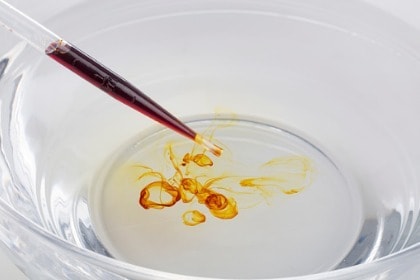
While povidone iodine is used externally only, nascent iodine can be used both externally and internally. It is sometimes called monatomic, atomic iodine, or just simply “atomidine.” According to many experts, it is also the best form of iodine supplement out there today.
You may have heard of potassium iodide or iodine obtained from kelp or from other sources. Unlike these products, nascent iodine does not need a carrier mineral. Thus it does not require extra energy from the body to be “converted” into a useable substance.
“Nascent” means “coming into being.” This form of iodine is incomplete at the atomic level (and thus waiting to “come into being”), but this is by no means is a bad thing. It simply means that it contains an odd number of electrons and carries an electromagnetic charge.
So what does all this translate to for your health? Simply put, nascent iodine is many times more absorbable than other kinds of iodine. It works quickly in the body but is also safe and requires less energy to do its job. When it comes to the thyroid and endocrine health, taking nascent iodine as an internal supplement can help your endocrine system stay in more consistent balance. This is beneficial for your hormones as well!
Nascent Iodine Has Been in Use Longer Than Povidone Iodine
Another difference between nascent and povidone iodine is that the nascent form of iodine has actually been around a lot longer. It was the “go-to” form of pre and post-surgery antiseptic iodine used by surgeons from when it was first developed in the 1920s until the reign of pharmaceutical companies began in earnest a few decades later.

Nascent iodine can still be used in all the external ways that povidone iodine and tincture of iodine can be used. Because it is not made using synthetic substances and manufacturing practices and does not contain alcohol, nascent iodine is less likely to cause a reaction.
When used internally, it can be both safe and extremely effective at:
- fighting infections
- raising immune system function
- balancing hormones
- helping the thyroid
- helping to maintain cardiovascular health
- increasing brain health
- and so much more [5]
Experts also claim that it contains chelating properties and is able to remove both heavy metals and toxic halides such as chlorine, fluoride, and bromide from the body [6].
When choosing an iodine supplement why not choose an “all-in-one” that is safe, effective and fast working for your health? Add Organixx all-organic, cleanly produced nascent iodine supplement to your toolbox for both internal and external use… and you will be well-prepared for whatever cut, scrape, or health challenge comes your way!
When your organs are working hard to detoxify, you want the purest form of iodine possible to help them work more efficiently. It only makes sense to use an organic form that’s totally natural and free of chemicals. Organixx Iodine is one of the only formulas that is USDA Certified Organic. It’s a pure, nascent form of iodine which your thyroid can use immediately.
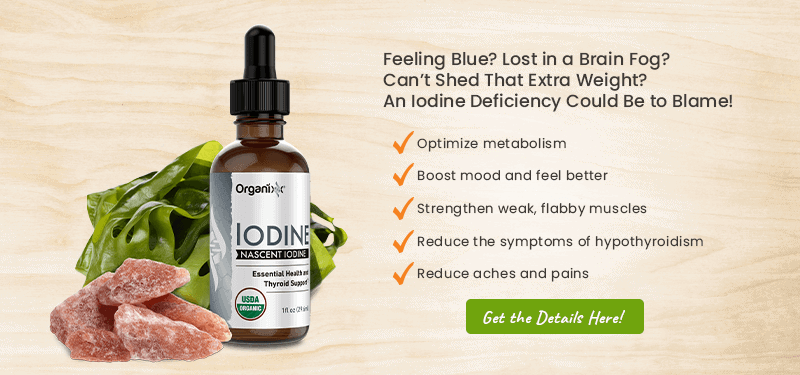
You have probably heard of the importance of essential minerals such as magnesium and selenium for staying healthy and vibrant at any age. But how much do you know about iodine?
The fact is that iodine is utilized for just about every function in your body. Yet many people are unaware of their body’s need for iodine, and that iodine deficiency has reached epidemic proportions worldwide.
10 Important Iodine Benefits
Here are 10 reasons why maintaining sufficient iodine levels is an absolute MUST for your health:
#1. Iodine Is Necessary for Metabolism and Thyroid Function
Metabolism is the act of converting food into substances your body can use. Iodine is an important part of this process. It helps the body break down food into nutrients via the thyroid gland and other mechanisms. Iodine is the literal “fuel” for the thyroid. Triiodothyronine (T3) and thyroxine (T4) are the main hormones that the thyroid produces.
For these hormones to be created, they need iodine. Good thyroid health also helps your body keep a steady heart rate, regulate temperature, improve digestion, and maintain a healthy weight [1].
#2. Iodine Helps Your Brain Stay Sharp
Iodine deficiency has been linked to cognitive decline in countless studies and is one of the “world’s most prevalent, yet easily preventable, cause[s] of brain damage,” according to the World Health Organization [2]. Iodine deficiency during pregnancy has been linked to autism in a recent University of Arizona study [3].
Furthermore, a 2013 Australian investigation published in the journal Frontiers in Neuroscience found that iodine supplementation improved the perceptual reasoning of slightly deficient children considerably [4].
#3. Iodine Protects the Body From Toxins
Fluoride, chlorine, and bromine are dangerous chemicals found in everything from new car interiors to tap water. They can also severely hinder thyroid function. Maintaining healthy iodine levels can block these “halide” chemicals from accumulating [5].
Iodine can also protect against xenoestrogens – “chemical mimics” – that can lead to reproductive conditions like ovarian cysts and uterine fibroids [6]. Some experts, such as author and natural health advocate Dr. Mark Sircus [7], point to the possibility that iodine may also help with mercury detoxification.
#4. Iodine Protects You From Radiation
In addition to flushing the dangerous “halides” mentioned above, iodine can also protect you from radiation exposure. It is a natural protectant from UV radiation for the eyes, according to a 2004 Austrian study [8].
Iodine supplementation can also be used to help individuals suffering from long-term radiation exposure. The effects of too much radiation can happen because of accidents, medical devices, and the radiation emitted by TSA scanners at airports.
A 2008 study [9] published in Radiation Research discovered that “terahertz radiation” like that found in airport x-ray scanners is linked to genetic mutation. Adequate amounts of iodine in the body is a must for anyone who travels a lot.
#5. Iodine Is a Natural Antiseptic
Maybe you remember that brownish-red solution your mom used to apply when you had a cut? For everything from cleaning wounds to purifying water, iodine is a sterilizing substance that can kill unhealthy organisms, bacteria and viruses.
A 2015 Iranian study found that a low-concentration iodine antiseptic used after oral surgery helped instigate first-stage wound healing in the surgery area, leading to faster recovery and less chance of infection [10].
#6. Iodine Is a Powerful Antioxidant
According to some experts [11], iodine may be as powerful in this regard as vitamin C! It can help reduce free radical damage that may lead to gene mutation and disease. It is a great boon for the immune system as it helps clean the blood of harmful pathogens.
A 2013 meta-analysis [12] published by the National Autonomous University of Mexico (UNAM) in the journal Thyroid found that iodine is “an antioxidant as well as an antiproliferative and differentiation agent” which can help clear up free radical damage in many organs of the body. It is also a powerful anti-inflammatory.
#7. Iodine Ensures Reproductive Health
Did you know that Japanese women have the lowest rates of breast cancer in the world? A 2003 report published in the journal Breast Cancer Research postulated that this could be a direct result of eating iodine- and selenium-rich seaweed, which is a staple in the Japanese diet [13].
Iodine is fuel for reproductive glands as well as the thyroid. Studies suggest that getting enough iodine can help prevent fibrocystic breast disease, preeclampsia, ovarian cancer, ovarian cysts, vaginitis, polycystic ovary syndrome, and even breast cancer. Enough iodine in the body is also one aspect of a healthy pregnancy [14].
#8. Iodine Helps Prevent Hair Loss
Besides protecting the skin and eyes from UV radiation, adequate levels of iodine can give your skin and hair a healthy glow. This is because iodine is involved in cellular rejuvenation [15]. Healthy iodine levels also help prevent hair loss because of the nutrients supplied to the thyroid gland [16]. Iodine in combination with other essential minerals such as iron, magnesium, and zinc can be a powerful internal tonic for thinning hair.
#9. Iodine Maintains Strong Teeth and Bones
Iodine assists in the production of strong teeth and bones by being a key player in calcium absorption. In fact, the connection between low iodine, low calcium absorption, and hypothyroidism has been known by researchers for at least the last hundred years [17].
One of the functions of the thyroid is the production of calcitonin, a hormone which helps balance blood calcium levels. This mechanism not only leads to maintain strong bones; it also plays a role in healthy functioning of the nervous system, heart and muscles.
#10. Iodine Helps Stabilize Your Mood
It is well known that low iodine levels can have an impact on the brain, as mentioned above. More recent research has also linked iodine deficiency to depression and anxiety. A 2004 study conducted by German researchers and published in the Journal of Psychiatry and Neuroscience [18] found a link between “alterations of thyroid-stimulating hormone (TSH) and mild cases of depression and anxiety.”
TSH is produced by the pituitary gland to signal the thyroid to produce more thyroid hormones. Fluctuations in TSH are often an indication that the thyroid is not getting enough iodine to do its job [19].
How Can You Get Enough Iodine?
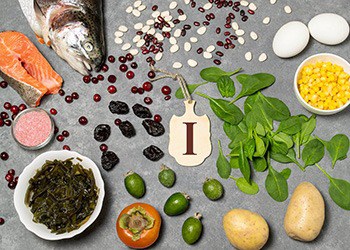
Odds are you are eating many whole foods, which already contain iodine. Among these are seaweed, high-quality seafood, eggs, strawberries, cranberries, dairy products, and dark green leafy vegetables. Sadly, because of poor soil quality and other factors in our toxic world, this may not be enough.
A study conducted by Royal North Shore Hospital in St. Leonards, Australia, found that 74% of healthy adults may not be getting adequate amounts of iodine through diet alone [20].
In addition, holistic health experts agree that relying on iodized table salt to get the right amount of iodine is not a wise option. This is because in order to produce commercial salt in the cheapest way possible, today’s manufacturers rely on harsh chemicals, which eventually wind up sprinkled on our dinner plates [21].
When it comes to iodine supplements, choose only the best.
Keep your standards high when it comes to iodine supplementation. Remember that iodine is the food of the thyroid, and the thyroid is the “command center” of all your hormones! You wouldn’t put junk into your mouth to feed your body, would you? Don’t put it in your thyroid either!
Iodine deficiency is widespread, not just in the U.S., but also globally. The World Health Organization estimates that roughly two billion people worldwide suffer from some form of iodine deficiency [22].
Don’t be another statistic. Stand out from the crowd by enjoying all the amazing health-supporting benefits that iodine can provide!
When your organs are working hard to detoxify, you want the purest form of iodine possible to help them work more efficiently. It only makes sense to use an organic form that’s totally natural and free of chemicals. Organixx Iodine is one of the only formulas that is USDA Certified Organic. It’s a pure, nascent form of iodine which your thyroid can use immediately.

The unique, amazing cordyceps mushroom (known scientifically as Cordyceps sinensis or more recently as Ophiocordyceps sinensis) has been used in Tibetan and traditional Chinese medicine since at least the 15th century.
An extremely rare combination of a caterpillar and a fungus, it is found at altitudes above 4,500 meters (over 14,000 feet) in the Himalayas, on the Tibetan plateau, and at other high-altitude locations worldwide.
In Tibet this fungus is known as yartsa gunbu, or “summer grass, winter worm.” It was initially identified when local herders observed that yak, goat, and sheep that ate cordyceps while grazing became very strong and stout. This observation led to a deeper examination and eventual understanding of its many uses and benefits.
Even today, traditional healers in many East Asian cultures recommend cordyceps as a tonic and claim that it supports greater levels of energy, appetite, stamina, libido, and endurance, along with improving sleeping patterns.
How Is Cordyceps Formed?
Cordyceps has a truly bizarre life cycle. Being parasitic in nature, its spores land on the caterpillars of certain moth species and enters their bodies. The infected caterpillars then bury themselves below the soil before they die.
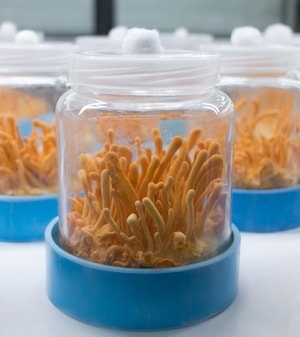
In summer, the fungus emerges from each infected caterpillar’s head, looking like a thin, orange finger. As the fungus approaches maturity, it consumes more than 90% of the infected insects, effectively mummifying its hosts.
Despite its unusual growth cycle, scientific studies over the past several years have shown that the cordyceps mushroom has a range of potential health applications.
Here are 6 of the best ways codyceps can support a healthy body.
Cordyceps Health Benefit #1: Helping to Manage Blood Sugar Levels
Multiple studies have shown that cordyceps can help in the safe management of blood sugar levels. For instance, in a laboratory study, a polysaccharide (a long chain, naturally-occurring compound made up of sugars bound chemically to each other) isolated from cordyceps was seen to lower blood sugar levels in mice predisposed to high blood sugar levels. This polysaccharide was also seen to lower blood levels of triglycerides and cholesterol.
Studies in normal rats have shown that consumption of cordyceps extracts helps to improve tissue sensitivity to insulin, while also lowering the insulin response to a carbohydrate challenge.
Indeed, extracts of cordyceps have been shown to slow down weight loss, reduce excessive thirst, improve glucose tolerance, and help to maintain blood sugar levels in a safe range in various laboratory rat models.
Cordyceps Health Benefit #2: Supporting Heart Health
 In laboratory experiments with rats and guinea pigs, a cordyceps extract was seen to help maintain regular heart rhythms. In fact, preparations made from cultured mycelia of cordyceps – which is the part of the mushroom that is made up of fine white filaments – has been approved for maintaining heart health in China.
In laboratory experiments with rats and guinea pigs, a cordyceps extract was seen to help maintain regular heart rhythms. In fact, preparations made from cultured mycelia of cordyceps – which is the part of the mushroom that is made up of fine white filaments – has been approved for maintaining heart health in China.
Further, consumption of cordyceps was seen to prevent much of the metabolic damage in both the livers and hearts of rats with chronic kidney disease.
Treatments to suppress the immune system are routinely used to prevent the body from rejecting a new heart after a heart transplant. However, the long term use of so-called “immunosuppressants” after transplant surgery leads to significant problems of its own.
Promisingly, a 2008 laboratory study showed that cordyceps extract helped to lower the rate of rejection of heart transplants in a laboratory rat model.
Cordyceps Health Benefit #3: Supporting Kidney Health
In China, cordyceps is routinely used to help maintain kidney health. Results from laboratory studies as well as clinical trials indicate that cordyceps may help to protect kidneys after transplantation.
For example, a preparation made from cordyceps mycelia reduced the rejection rate after kidney transplants, while also helping to maintain kidney and liver function as well as red blood cell production within healthy limits.
Similarly, another cordyceps product known as CS-4 has been shown to help maintain blood levels of urea, creatinine, total blood protein, and calcium within safe, normal levels. In a 2016 laboratory study in mice, powdered extracts of cordyceps were seen to help maintain kidney health.
Cordyceps Health Benefit #4: Supporting the Immune System
In a 2012 study, cordyceps polysaccharides were seen to overcome induced immunosuppression, while also helping to maintain lymphocyte and macrophage function within normal levels in mice.
Lymphocytes are known to be potent orchestrators of the immune system’s response to infections and injury. Macrophages are a type of cell responsible for detecting, engulfing, and destroying pathogens and damaged and dying cells in the body (including cancer cells).
Cordyceps polysaccharides also improved antioxidation activity in mice with suppressed immune systems, while also raising the levels of the natural antioxidants superoxidase dismutase, catalase, and glutathione peroxidase.
Cordyceps Health Benefit #5: Maintaining libido
Cordyceps has traditionally been used for helping to maintain libido and sexual function in many Eastern societies.
Laboratory experiments on animals confirm that cordyceps can help to improve reproductive activity, while consumption of cordyceps has been shown to help maintain libido and sexual activity in both men and women.
Cordyceps Health Benefit #6: Helping to Combat Fatigue
A 2010 study showed that supplementation with the cordyceps extract CS-4 for 12 weeks helped to combat fatigue and improved exercise performance, while also helping to maintain overall wellness in 20 healthy elderly adults.
Cordyceps contains adenosine and is known to be able to stimulate production of ATP, one of the primary sources of energy in our body’s cells.
Indeed, a 2007 study concluded that higher production of ATP because of cordyceps consumption helped athletes maintain intense workouts while also extending the periods of time they were active at high intensity.
Finally, studies have shown that supplementing with cordyceps can help lower heart rate, which likely explains why people can train harder for longer periods when supplementing with cordyceps.
Cordyceps: Side Effects
Cordyceps has been associated with relatively minor side effects, including gastrointestinal upset or discomfort, diarrhea, nausea, and dry mouth. It is also known to interact with caffeine, immunosuppressants, and anticoagulants.
Health experts recommend not taking cordyceps supplements if you have autoimmune conditions or bleeding disorders to avoid increasing the risk of aggravating symptoms. It is recommended that you always consult your healthcare provider before taking any supplements, including cordyceps.
7 Mushrooms from Organixx contains 7 of nature’s most powerful mushrooms for anti-aging, longevity, and immune support. Using centuries-old knowledge of the power of nutritional mushrooms and our breakthrough new formulation process we’ve unleashed the power of mushrooms in a way never before done.
Originally used in the East as both traditional medicine and food, many mushroom varieties have been studied intensively for their therapeutic properties over the past few decades. In fact, all edible mushrooms seem to possess both medicinal and nutritional benefits, although they must be prepared properly to release their full benefits.
Modern scientific evidence shows that medicinal mushrooms typically act to help strengthen the immune system, lower the risk of cardiovascular disease, and help our bodies fight against free radicals, mutagens, and toxins.
These health benefits of mushrooms seem to exist mainly because of the presence of polysaccharides (complex sugar molecules) called beta glucans in their cell walls. Beta glucans are also present in cereal grains, algae, bacteria, fungi, and yeast.
Early human clinical trials with beta glucans have confirmed that they have an immune-strengthening effect and are safe to consume, with minimal to no side effects for most people.
Along with boosting immunity, many of these potent mushrooms have other health benefits as a result of their actions on our bodies. Let’s take a closer look at what researchers have found…
Health Benefit of Mushrooms #1: Powerful Anti-Cancer Fighters
Brewed for thousands of years as a medicinal tea in China, turkey tail mushroom (known scientifically as Trametes versicolor or Coriolus versicolor) is used extensively in Asia to fight cancer.
One notable use is a turkey tail mushroom extract known as PSK (protein-bound Polysaccharide Krestin) that is widely used to 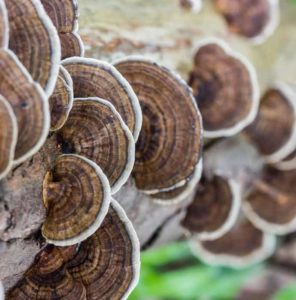 boost the immune system when treating many types of cancer in Japan.
boost the immune system when treating many types of cancer in Japan.
Multiple studies have confirmed that PSK prevents cancer cell growth with minimal adverse effects, while also simultaneously reducing side effects of standard anti-cancer therapy such as fatigue, loss of appetite, nausea, vomiting, and pain.
For instance, PSK has been shown to act powerfully against lung cancer and strengthen the immune systems of lung cancer patients, helping them to cope better with the consequences of toxic and invasive anti-cancer treatment.
Additionally, PSK has been shown to ease tumor-associated symptoms, and extend lifespan in patients undergoing radiation therapy and chemotherapy.
Along with all this, turkey tail mushroom extracts have also been found to:
- Slow breast cancer cell growth, reducing tumor weight by 36% and lowering metastasis to the lungs by 70.8% in a mouse model of metastatic breast cancer. [Note: metastasis is the spread of cancer cells from the original area where it began to other areas in the body, usually via the lymphatic system or bloodstream. In this mouse model, breast cancer cells metastasized to the lungs.]
- Slow the growth of human esophageal cancer cells by reducing their survival time and increasing their rate of apoptosis (also known as programmed cell suicide).
- Target cancer stem cells, preventing the formation of prostate tumors in a mouse model of prostate cancer – with an incredible efficiency of 100 percent and no side-effects whatsoever!
Red reishi is another popular medicinal mushroom. Known scientifically as Ganoderma lucidum, this potent “mushroom of immortality” is known as ling zhi in Chinese and reishi in Japanese.
Reishi may help patients to beat cancer in multiple ways. First, it stimulates the immune system, helping the body fight more effectively against cancer.
Second, a bioactive compound known as canthaxanthin (and possibly others) in reishi have been shown to help slow down tumor growth. Third, beta glucan – another bioactive compound – helps immune cells to bind more effectively to tumor cells and kill them more easily.
Because of these powerful anti-cancer abilities shown by reishi in both laboratory research and clinical usage, the Japanese government officially recognizes it as an anti-cancer therapy.
However, if you’re thinking of adding a reishi supplement or extract to your daily regimen you should seek medical advice from a qualified healthcare practitioner as to the appropriate dose for your specific health condition. Doses of commercial reishi products can vary widely and may not align with the research dosages studied.
Health Benefit of Mushrooms #2: Strengthening the Immune System
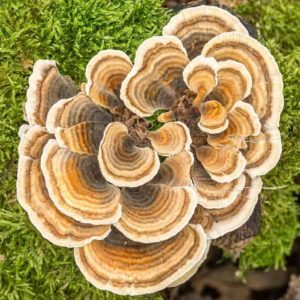 Along with helping to prevent abnormal cell growth, turkey tail mushroom extracts have been shown to help repair weakened immune systems in breast cancer patients after they had undergone standard chemotherapy and radiation therapy.
Along with helping to prevent abnormal cell growth, turkey tail mushroom extracts have been shown to help repair weakened immune systems in breast cancer patients after they had undergone standard chemotherapy and radiation therapy.
These mushroom extracts appear to do this by boosting the number and activity of natural killer (NK) cells and “cytotoxic T-cells,” which likely attack and kill off any remaining cancerous cells that are left after conventional anti-cancer therapies. [Note: NK cells are specialized immune cells that recognize and bind to tumor cells and virus-infected cells and kill them. Similarly, cytotoxic T-cells are a type of white blood cell that kills cancer cells, cells that are infected (especially with viruses), or cells that are damaged in other ways.]
Scientific research also shows that bioactive polysaccharide compounds in reishi mushrooms boost the immune system by increasing the number of macrophages. [Note: Macrophages are a type of white blood cell that digests cellular debris as well as foreign substances, bacteria, cancer cells, and anything else that cannot be identified as a healthy cell by our immune system.]
As already described above, a bioactive beta glucan compound in reishi helps immune cells bind more effectively to tumor cells and kill them more easily.
All of these immune-boosting actions of reishi have major implications for people suffering from bacterial and viral infections, as well as people with AIDS and other diseases that directly weaken their immune system. No wonder the patented turkey tail mushroom extract PSK (protein-bound Polysaccharide Krestin) has been widely used in Japan as a complementary immunotherapy for treating many different types of cancers since the early 1980s.
Health Benefit of Mushrooms #3: Protection Against Heart Disease and Stroke
Reishi appears in studies to offer a remarkable level of protection against heart disease and stroke, because it supports the body against many risk factors for these conditions.
Health experts now believe that bioactive compounds in reishi known as ganoderic acids and others such as coumarin, mannitol, and polysaccharides act to:
- Lower triglyceride levels
- Remove excess cholesterol from blood
- Lower blood pressure (BP)
- Reduce platelet stickiness, preventing the formation of dangerous blood clots that can lead to heart attacks or strokes
- Help to correct arrhythmia (abnormal heart rhythms)
According to one study reported in the book Alternative Medicine to Heart Disease by Burton Goldberg in the late 90s, taking reishi extract three times a day for four weeks lowered blood pressure (BP) in 54 people with hypertension, who were otherwise unresponsive to medication.
Health Benefit of Mushrooms #4: Fighting Disease-Causing Free Radicals
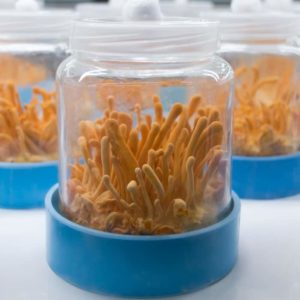 Oxidative stress and other forms of free radical-induced damage to cellular structures in our bodies are believed to increase the risk for heart disease, stroke, high blood pressure (BP), diabetes, cancer, Alzheimer’s disease, and other age-related conditions.
Oxidative stress and other forms of free radical-induced damage to cellular structures in our bodies are believed to increase the risk for heart disease, stroke, high blood pressure (BP), diabetes, cancer, Alzheimer’s disease, and other age-related conditions.
Free radicals are highly unstable chemical compounds which attack the nearest stable molecule and “steal” its electron. When the “attacked” molecule loses its electron in this way, it becomes a free radical itself, beginning a chain reaction.
If this process cascades, the growing numbers of free radicals can damage vital structures in your body such as the outer protective membrane of your body’s cells, cellular proteins, and even your DNA.
When you are exposed to excessive amounts of free radicals – for example, because of exposure to toxic chemicals, infections, and diseases – and your body’s detoxification systems are no longer able to cope, it can lead to the unhealthy situation known as “oxidative stress.”
Promisingly, a 2015 study published in the International Journal of Medicinal Mushrooms showed that consumption of reishi extracts for 2 weeks was able to restore some of the innate antioxidant enzyme activity in a rat with diabetes.
[Note: Antioxidants are molecules which neutralize harmful free radicals and protect vital cellular structures in our bodies from their damaging actions. While many antioxidants are obtained naturally from the foods we eat, our body also contains innate antioxidant enzyme systems.]
Similarly, in a laboratory mouse experiment reported in the journal Scientific Reports in 2015, a polysaccharide peptide isolated from reishi was seen to counteract oxidative stress caused by kidney damage, leading to lower levels of free radicals known as “reactive oxygen species” (ROS) and improved kidney function.
Some health researchers suspect that reishi may not have antioxidant compounds of its own, but rather it stimulates production of a free radical fighter that already exists in our own bodies; the innate antioxidant enzyme system known as superoxide dismutase (SOD).
Similarly, scientific evidence indicates that the amazing mushroom cordyceps – known scientifically as Cordyceps sinensis – also has potent antioxidant activity, which is believed to be partly responsible for its purported anti-aging, anti-cancer, anti-inflammatory, and immunomodulatory effects.
Health Benefit of Mushrooms #5: Managing Blood Sugar Levels
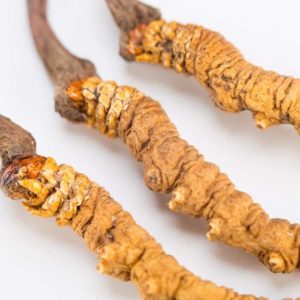 Cordyceps grows in the Himalayas and on the Tibetan plateau and has a very interesting, if slightly bizarre life cycle.
Cordyceps grows in the Himalayas and on the Tibetan plateau and has a very interesting, if slightly bizarre life cycle.
Its spores land on the caterpillars of a particular moth species and enter its body. The caterpillar then buries itself into the soil before it dies. In summer, the fungus emerges like a plant from the caterpillar’s head, looking like a thin, orange finger.
Multiple studies discussed in the textbook Herbal Medicine: Biomolecular and Clinical Aspects (2nd edition) demonstrate that cordyceps can lower blood glucose levels. For instance, one study showed that consumption of a cordyceps extract known as CS-4 for 25 days increased insulin sensitivity, while reducing the insulin response to a carbohydrate challenge in normal, non-diabetic rats. These results indicate that CS-4 can potentially lower diabetes risk.
Similarly, in another study, normal rats given CS-4 for 17 days showed significant reductions in their fasting blood glucose and fasting plasma insulin levels.
While cordyceps did not affect fasting insulin levels in diabetic rats, they improved their weight, fasting blood glucose levels, and glucose tolerance (an indicator of diabetes risk) in these animals.
These and many other results from multiple studies indicate that cordyceps is likely to be useful in keeping blood sugar levels under control in patients suffering from diabetes.
Health Benefit of Mushrooms #6: Helping to Manage Stress Effectively
Reishi is an adaptogen – one of many plant forms that help to balance, restore, and protect the body. Specifically, adaptogens enhance the body’s overall ability to cope more effectively with stress and resist its unwelcome consequences, perhaps by actions on the body’s adrenal system, which is responsible for stress management.
Adaptogens exert a normalizing and tonic influence, neither over-stimulating nor interfering with normal body function, and help to counter the effects of chronic stress, anxiety, and insomnia on our bodies.
Many herbs, including Chinese or Korean ginseng, ashwagandha (Indian ginseng), astragalus, licorice root, holy basil, and mushrooms such as cordyceps and reishi are known adaptogens.
The philosophy of Eastern medicine states that our bodies need to defend themselves against threats to their “equilibrium.” Physical threats include viruses and bacteria, while mental or emotional threats (including stress) lead to anxiety and other unpleasant emotions that depress the immune system and overall functioning of the body.
Whatever the threat, reishi’s reputation is that it helps the body keep its innate balance and defend against threats to its equilibrium. Since diseases like heart disease and cancer are also clear signs that the body is out of balance, practitioners of traditional forms of Eastern medicine believe that an equilibrium-enhancing remedy such as reishi can help to treat these and many other ailments.
Health Benefit of Mushrooms #7: Enhancing Libido
Testosterone is necessary for normal sperm development. Cordyceps has traditionally been used for enhancing sexual function in many Eastern societies.
many Eastern societies.
Evidence from laboratory experiments on animals confirms that cordyceps can both improve reproductive activity and restore impaired reproductive function.
Indeed, consumption of cordyceps has been shown to enhance libido and sexual activity, and restore impaired reproductive function in both men and women – likely by enhancing testosterone release in the body.
Health Benefit of Mushrooms #8: Improving Exercise Performance
Cordyceps made international headlines after Chinese runners broke two world records by huge margins at the Asian Games in 1993. According to their coach, the secret to their remarkable athletic performance was the so-called caterpillar fungus, Cordyceps sinensis.
A 2010 study reported in the Journal of Alternative and Complementary Medicine found that supplementation with the cordyceps extract CS-4 for 12 weeks improved exercise performance and contributed to overall markers of wellness in 20 healthy elderly adults.
One way cordyceps likely improves physical abilities and stamina is because it contains adenosine – a critical component of ATP – thereby stimulating production of ATP, one of the primary sources of energy in the cells of our bodies.
A 2007 study out of Hong Kong found that higher production of ATP by cordyceps helped athletes maintain intense workouts while also extending the length of time they were active at a high intensity.
A number of studies have also shown that supplementing with cordyceps can lower heart rate, which explains why people say they can train harder for longer periods when taking cordyceps supplements.
Health Benefit of Mushrooms #9, #10 & #11
Japanese researchers have found that certain bioactive compounds present in reishi act as natural antihistamines, providing strong anti-allergic benefits.
If you suffer from muscle aches or arthritis, some health experts claim that reishi is as powerful and as effective as hydrocortisone for helping to relieve inflammation and pain, but with fewer side effects.
Finally, reishi mushrooms are traditionally believed to be able to calm the mind, along with improving memory, concentration, and focus which are important for combatting the effects of cognitive decline.
What’s the Best Way to Consume Mushrooms?
Mushrooms have long been used for both culinary and therapeutic purposes. They are available and used in many formats including fresh mushrooms, dried mushrooms, and mushroom extracts.
If you love eating mushrooms for their nutritional benefits, you can learn more about the best way to cook mushrooms here. While not a high source of dietary fiber, as a food they are a good source of vitamins and (as we’ve discussed above) antioxidants and other compounds which have an astounding array of health benefits.


